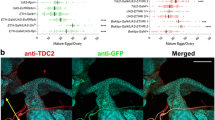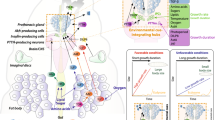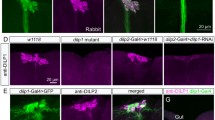Abstract
dFOXO transcription factor is a component of the insulin/insulin-like growth factor signaling pathway in Drosophila. Juvenile hormone negatively regulates dFOXO gene expression. In the present work, the effect of hypomorphic dFOXO mutation on juvenile hormone metabolism under normal and stressing conditions and on D. melanogaster female resistance to thermal stress was studied. It was demonstrated that dFOXO mutation in D. melanogaster females induces (1) an increase in the level of juvenile hormone degradation and in the intensity of the response of the juvenile hormone metabolism system to thermal stress and (2) a decrease in thermal stress resistance. These parameters are indicators of the level of juvenile hormone synthesis and indicate its decrease in females with decreased dFOXO expression. Thus, the presence of feedback in the regulation of dFOXO gene expression by juvenile hormone was established for the first time.
Similar content being viewed by others
References
Toivonen, J.M. and Partridge, L., Endocrine regulation of aging and reproduction in Drosophila, Mol. Cell. Endocrinol., 2009, vol. 299, pp. 39–50.
Kannan, K. and Fridell, Y.W., Functional implications of Drosophila insulin-like peptides in metabolism, aging, and dietary restriction, Front. Physiol., 2013, vol. 4, p. 288. doi 10.3389/fphys.2013.00288
Puig, O. and Tjian, R., Transcriptional feedback control of insulin receptor by dFOXO/FOXO1, Genes Dev., 2005, vol. 19, pp. 2435–2446.
Belgacem, Y.H. and Martin, J-R., Hmgcr in the corpus allatum controls sexual dimorphism of locomotor activity and body size via the insulin pathway in Drosophila, PLoS One, 2007, vol. 2. e187. doi 10.1371/journal.pone.0000187
Tu, M.-P., Yin, C.-M., and Tatar, M., Mutations in insulin signaling pathway alter juvenile hormone synthesis in Drosophila melanogaster, Gen. Comp. Endocrinol., 2005, vol. 142, pp. 347–356.
Tatar, M., Bartke, A., and Antebi, A., The endocrine regulation of aging by insulinlike signals, Science, 2003, vol. 299, pp. 1346–1351.
Raushenbakh, I.Yu., Karpova, E.K., Adon’eva, N.V., and Gruntenko, N.E., InR gene expression and octopamine metabolism in Drosophila melanogaster females, Russ. J. Genet., 2014, vol. 50, no. 3, pp. 315–318.
Richard, D.S., Rybczynski, R., Wilson, T.G., et al., Insulin signaling is necessary for vitellogenesis in Drosophila melanogaster independent of the roles of juvenile hormone and ecdysteroids: female sterility of the chico 1 insulin signaling mutation is autonomous to the ovary, J. Insect Physiol., 2005, vol. 51, pp. 455–464.
Karpova, E.K., Adon’eva, N.V., Faddeeva, N.V., et al., Insulin affects reproduction and juvenile hormone metabolism under normal and stressful conditions in Drosophila females, Dokl. Biochem. Biophys., 2013, vol. 452, nos. 1–6, pp. 264–266.
Mirth, C.K., Tang, H.Y., Makohon-Moore, S.C., et al., Juvenile hormone regulates body size and perturbs insulin signaling in Drosophila, Proc. Natl. Acad. Sci. U.S.A., 2014, vol. 111, pp. 7018–7023.
Gruntenko, N., Wen, D., Karpova, E.K., et al., Altered juvenile hormone metabolism, reproduction and stress response in Drosophila adults with genetic ablation of the corpus allatum cells, Insect Biochem. Mol. Biol., 2010, vol. 40, pp. 891–897.
Gruntenko, N., Chentsova, N.A., Andreenkova, E.V., et al., Stress response in a juvenile hormone deficient Drosophila melanogaster mutant apterous 56f, Insect Mol. Biol., 2003, vol. 12, pp. 353–363.
Gruntenko, N., Laukhina, O.V., Bogomolova, E.V., et al., Downregulation of the dopamine 2-like receptor in corpus allatum affects juvenile hormone metabolism in Drosophila melanogaster females, J. Insect Physiol., 2012, vol. 58, pp. 348–355.
Author information
Authors and Affiliations
Corresponding author
Additional information
Original Russian Text © I.Yu. Rauschenbach, E.K. Karpova, N.E. Gruntenko, 2015, published in Genetika, 2015, Vol. 51, No. 9, pp. 1083–1086.
Rights and permissions
About this article
Cite this article
Rauschenbach, I.Y., Karpova, E.K. & Gruntenko, N.E. dFOXO transcription factor regulates juvenile hormone metabolism in Drosophila melanogaster females. Russ J Genet 51, 932–934 (2015). https://doi.org/10.1134/S1022795415080086
Received:
Accepted:
Published:
Issue Date:
DOI: https://doi.org/10.1134/S1022795415080086




